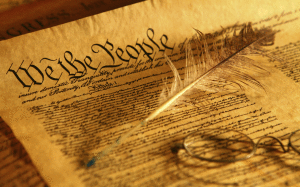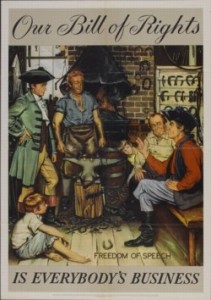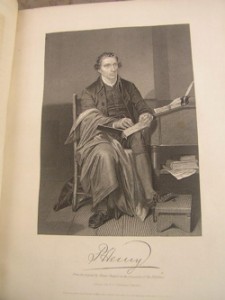 The other day I was engaged in an interesting debate on Facebook over the question of: Has the Constitution and Bill of Rights failed the people or have the people failed the ideals expressed in those documents? It was so interesting that my mind wouldn’t let go of the subject; it kept tossing ideas around and coming up with alternative ways in which I could have answered questions posed to me. It was during this process that the idea for what you are about to read began.
The other day I was engaged in an interesting debate on Facebook over the question of: Has the Constitution and Bill of Rights failed the people or have the people failed the ideals expressed in those documents? It was so interesting that my mind wouldn’t let go of the subject; it kept tossing ideas around and coming up with alternative ways in which I could have answered questions posed to me. It was during this process that the idea for what you are about to read began.
During the debate I stated that it was my belief that the answer to the question was a little bit of both; the Constitution and Bill of Rights failed the people and the people failed the ideals expressed in those documents. I know that sounds like typical doublespeak to avoid giving a definite answer, but if you keep reading I think I will be able to explain why I said that.
First of all, there are two periods of American History that absolutely fascinate me; the period which saw our nation gain its independence and establish its own system of government, and the period leading up to, including, and following the Civil War. As it pertains to the establishment of our system of government I find Madison’s Notes on the Constitutional Convention and the writings of the anti-Federalists; authors like Cato, Centinel, Brutus, the Federal Farmer, John De Witt, and Patrick Henry to be particularly interesting.
 Now you might say, “Why not just read the Constitution and be done with it?” I suppose that is a valid question, so allow me to provide an answer. While I could do that, I like to read the arguments that took place both during the process which produced the finished document, and the resulting argument over whether to accept or reject the plan proposed by the Philadelphia Convention. Doing that provides me with much more insight into the thoughts of those who sought to shape our system of government into their vision of what a government should be, and the warnings of those who sought to prevent this system of government from being implemented.
Now you might say, “Why not just read the Constitution and be done with it?” I suppose that is a valid question, so allow me to provide an answer. While I could do that, I like to read the arguments that took place both during the process which produced the finished document, and the resulting argument over whether to accept or reject the plan proposed by the Philadelphia Convention. Doing that provides me with much more insight into the thoughts of those who sought to shape our system of government into their vision of what a government should be, and the warnings of those who sought to prevent this system of government from being implemented.
Had I not studied these documents I would probably have been of the opinion that there is not a damned thing wrong with our Constitution, or in this country for that matter. But, having read them I realize that our Constitution isn’t the greatest thing since sliced bread, and that our government certainly doesn’t adhere to the few limits it does impose upon it. Now that is primarily due to the fact that people, more often than not, choose to vote for candidates according to their party loyalty than they do vote for candidates who campaign on a purely constitutional platform; which means that, yes, the people have failed the Constitution.
Had the people, (and this goes way back in our history), been kept informed, and adhered to the limits the Constitution imposes upon our government, I believe that more than half the problems we face today as a country would not exist. But, because the voters themselves do not know, or care, what the Constitution says, they elect candidates who have no intention, or desire, to support and defend it. It is a vicious cycle that repeats itself every election cycle and won’t stop until the people take the time to learn what the drafters of the Constitution intended when they wrote it.
So, as Lysander Spooner so aptly said, “But whether the Constitution really be one thing, or another, this much is certain – that it has either authorizes such a government as we have had, or has been powerless to prevent it. In either case it is unfit to exist.” I could almost stop right there, saying that is how I feel about our system of government, and the document that established it…but I won’t.
You see, even though the Constitution outlined a fundamentally sound system of government – in theory, the problem is that it was the creation of a group of men who held differing views on what government should look like and what powers it should hold. I think Ben Franklin explained it best when he said, “For when you assemble a Number of Men to have the Advantage of their joint Wisdom, you inevitably assemble with those Men all their Prejudices, their Passions, their Errors of Opinion, their local Interests, and their selfish Views. From such an Assembly can a perfect Production be expected? It therefore astonishes me, Sir, to find this System approaching so near to Perfection as it does…” (Source: Franklins Final Address to the Constitutional Convention)
But, could that, in and of itself, have been the fatal flaw in the whole process; the willingness to settle for something not quite perfect just so they could have a system of government to call their own? Not to be an armchair quarterback or a back seat driver, but I have over 150 documents from authors who expressed their concerns over what would happen if the system of government outlined by the Constitution was put into operation.
There were many concerns expressed by these patriots who opposed the Constitution, but the underlying theme that can be found in most of their writings is that the Constitution created a consolidation of the States into a Union under a strong centralized government.
One of the questions I was asked by a person saying we failed the Constitution was, what is a Republic. Simply stated a Republic is a system in which the ultimate power in government is held by the people; which is then exercised by elective representatives. One could also add, ‘according to the rule of law’ as well.
At the time I answered I was giving the textbook definition; something that could have been found had one simply Googled the word Republic. Later I did some research of my own and found this, taken from Vattel’s Law of Nations, “Finally, several sovereign and independent states may unite themselves together by a perpetual confederacy, without ceasing to be, each individually, a perfect state. They will together constitute a federal republic: their joint deliberations will not impair the sovereignty of each member, though they may, in certain respects, put some restraint on the exercise of it, in virtue of voluntary engagements. A person does not cease to be free and independent, when he is obliged to fulfill engagements which he has voluntarily contracted.”
Now that might seem a bit complicated, so let me endeavor to explain it a bit more. At the end of the Revolution there was not a United States of America; at least not as we know it today. At that point in our history each State was sovereign and independent from the others, with a Congress having been established to act as sort of an intermediary for the common needs and security of them all.
This is what is known as a Confederation, or a federal form of government; where the States retain a majority of the sovereign power; giving only a few delegated powers to the central government. At the same time, each State had already established a republican form of government for themselves by their having written constitutions, framing a system of government that was duly ratified by the inhabitants of each State.
In essence, at the end of the Revolution we had 13 independent republics in America which had a central government whose authority extended only to the States as political entities; while the States held all the power over the lives and liberty of the people.
One of the primary concerns of the anti-Federalists was: Did the Constitution do away with the status quo and create a consolidation of the States into a single, indivisible Union; or Republic, or did the States still retain all powers which were not expressly given; allowing the government to intrude into and interfere with the lives and liberties of the people?
In a speech opposing ratification of the Constitution, Patrick Henry expressed those exact sentiments as follows, “I rose yesterday to ask a question which arose in my own mind. When I asked that question, I thought the meaning of my interrogation was obvious: The fate of this question and of America may depend on this: Have they said, we, the States? Have they made a proposal of a compact between states? If they had, this would be a confederation: It is otherwise most clearly a consolidated government. The question turns, Sir, on that poor little thing-the expression, We, the people, instead of the States, of America.“
You see, the people had ALREADY established republics by their having created their own State Legislatures, so why would they need to create another Republic which would govern them all? The purpose for which the delegates were sent to Philadelphia was so that they could come up with suggestions for amendments to make the existing Confederation Government adequate for the needs of the country; not to toss the existing form of government in the trash heap and replace it with one of their creation.
If the powers given to this new form of government were to be exercised primarily upon the States, then why did the drafters of the Constitution demand that it be ratified by the voice of the people; as it was the States whose authority would be further restricted, or usurped, by the creation of this new form of government. However, if this new system of government was, in fact, a consolidation and a diminishing of the sovereignty of the States, then it would make sense that the people must give their consent to it.
Yet, in Federalist 45 James Madison attempted to ensure the people that the States would retain their authority over the lives and liberties of the people by saying, “The powers delegated by the proposed Constitution to the federal government are few and defined. Those which are to remain in the State governments are numerous and indefinite. The former will be exercised principally on external objects, as war, peace, negotiation, and foreign commerce; with which last the power of taxation will, for the most part, be connected.
The powers reserved to the several States will extend to all the objects which, in the ordinary course of affairs, concern the lives, liberties, and properties of the people, and the internal order, improvement, and prosperity of the State.”
I think if you were to be honest with yourself, then you will be forced to admit that the Constitution ended up creating a system of government that has not respected the boundaries which separate its authority from that which was supposed to be reserved to the States.
This intrusion upon State sovereignty is even more apparent when one looks at the Bill of Rights. There is a huge misconception that the Bill of Rights applies to the States as well as the federal government; which simply is not true.

What does the Bill of Rights do? Now some of you may answer, “It protects certain rights against governmental interference.” That is only partially true; for you leave out which government it protects them from. The Bill of Rights are amendments to the Constitution which created our federal government; not the constitutions which framed the various State governments. Therefore, technically they only apply to the federal government. Yet an argument can also be made that, since the Constitution itself is the Supreme Law of the land, any amendment to it could be implied to apply to the States as well.
But to keep things simple, let’s just say that the Bill of Rights only applies to the federal government. How is it then that the government can dictate what kind of guns private citizens may own; how is it that the Supreme Court, (which is PART of the federal government) decide whether a State may display the Ten Commandments, or that children be prohibited from praying in school; how is it that the federal government can violate the 4th Amendment by spying upon the private conversations of every man, woman and child in this country…just to keep us safe from terrorism?
I could go on and on, listing a whole list of things the federal government has done which are not among the powers listed in Article 1, Section 8 as those powers given to Congress; which in case you have forgotten, is the lawmaking body of our government; not the President as so many seem to think.
This has all been done because of the concept of implied powers; something introduced while George Washington was President. That occurred because the Constitution itself did not provide specific enough limitations upon the powers it was granting government; leaving loopholes by which government has expanded its power well beyond those originally intended.
So, if that is true, then the Constitution itself failed the people as it did not provide sufficient means for the people to resist the encroaching powers of government and to ward off tyranny and oppression.
Now you might say, but we can vote them out of office; but is that punishing them? When we violate the law we are either fined or sentenced to jail time for our having violated the laws enacted by government. When is the last time you recall hearing an elected official being fined or jailed for violating the Constitution? I’ll give you a minute to think about it.
I can’t recall a single instance of it; and that includes the Watergate Scandal which led to the resignation of Richard Nixon. You see, Nixon never served a day in jail, nor was he fined for his crimes. Impeachment is not punishment, it is merely removal from office.
 Returning to Patrick Henry and his opposition to the Constitution, we see that he made two important statements regarding this flaw in the Constitution. On June 5, 1788 Henry stated, “The Honorable Gentleman who presides, told us, that to prevent abuses in our Government, we will assemble in Convention, recall our delegated powers, and punish our servants for abusing the trust reposed in them. Oh, Sir, we should have fine times indeed, if to punish tyrants, it were only sufficient to assemble the people. Your arms wherewith you could defend yourselves, are gone; and you have no longer an aristocratical; no longer democratical spirit. Did you ever read of any revolution in a nation, brought about by the punishment of those in power, inflicted by those who had no power at all?“
Returning to Patrick Henry and his opposition to the Constitution, we see that he made two important statements regarding this flaw in the Constitution. On June 5, 1788 Henry stated, “The Honorable Gentleman who presides, told us, that to prevent abuses in our Government, we will assemble in Convention, recall our delegated powers, and punish our servants for abusing the trust reposed in them. Oh, Sir, we should have fine times indeed, if to punish tyrants, it were only sufficient to assemble the people. Your arms wherewith you could defend yourselves, are gone; and you have no longer an aristocratical; no longer democratical spirit. Did you ever read of any revolution in a nation, brought about by the punishment of those in power, inflicted by those who had no power at all?“
Then on June 7th Henry rose up again and said, “Where is the responsibility — that leading principle in the British government? In that government a punishment, certain and inevitable, is provided: But in this, there is no real actual punishment for the grossest maladministration. They may go without punishment, though they commit the most outrageous violation on our immunities. That paper may tell me they will be punished. I ask, by what law? They must make the law — for there is no existing law to do it. What — will they make a law to punish themselves? This, Sir, is my great objection to the Constitution, that there is no true responsibility — and that the preservation of our liberty depends on the single chance of men being virtuous enough to make laws to punish themselves.”
I defy anyone to sit down and actually read the Constitution, and then provide me with the Article and Clause which grants any of us the authority to arrest and charge any of our elected officials for the crime of violating the Constitution. Such a clause simply does not exist within that document; and that is why I say that the Constitution failed the people; because it did not provide them the means to oppose a government that no longer adheres to any kind of limits upon their power and authority.
It took me a long time to accept this, but the Constitution isn’t all that it is cracked up to be. However, once I came to accept that, it opened my mind to the realization that voting is not the answer to our country’s problems; not that there is an answer when the majority of the people still place their faith and trust in lawmakers who refuse to adhere to the limits imposed upon their power.
But, as one who has more than a rudimentary understanding of how their system of government was supposed to work, and the reasons for which certain rights were protected by Constitutional Amendment, I cannot consent to a government that refuses to do the job it was established to do; that and NOTHING MORE!!!
I don’t care which party is in control of our government, I only care whether the party that is in control adheres to the Constitutional limitations imposed upon them and seeks to protect and defend my rights…that and nothing more. If government does not do this, then I revoke my consent to being governed by it.
Sure, I may obey the laws they impose upon me just to stay out of prison, but I do so in protest and I certainly do not support it simply because it is run by the person I voted for.
And that is why I quoted Lysander Spooner earlier, and why I will quote him again, “But whether the Constitution really be one thing, or another, this much is certain – that it has either authorizes such a government as we have had, or has been powerless to prevent it. In either case it is unfit to exist.”
I honestly cannot say what would have happened had the Constitution been rejected by the people and the Confederation continued on as it was. I can only say that the government the Constitution outlined and established has proven to be far worse than the one our Founders fought a war to free themselves from; of that much I am absolutely certain.
My question for you is; why do you support it or ignore the fact that your government no longer resembles or represents the ideals and beliefs which led our Founders to seek their independence from a tyrant. Why do you so meekly submit to tyranny and oppression today? Is there not a drop of patriotic blood in your bodies?
If there was, you would certainly not be supporting the crooks who seek your vote. If there was you’d be marching upon our nation’s capital, with guns in hand and 12 foot lengths of rope so you could string them up from the lamp posts.
All I see is a nation of sheep who meekly obey the commands of their masters. What has become of the land of the free and the home of the brave? LaVoy Finicum was brave and he was gunned down in cold blood; with the media and the people calling him an extremist. Edward Snowden was brave, and the people called him a traitor; forcing him into exile in Russia.
I think were Thomas Jefferson, Patrick Henry, and Samuel Adams alive today they would either have fled the country, or be serving time in Guantanamo Bay as domestic terrorists. That’s because the people of this country no longer care about limited government or individual liberty; all they care about is comfort and security; and which party can best provide it for them.
And it makes me sick to my stomach to watch…
 ~ The Author ~
~ The Author ~
Neal Ross, Student of history, politics, patriot and staunch supporter of the 2nd Amendment. Send all comments to: bonsai@syix.com.
If you liked Neal’s latest column, maybe you’ll like his latest booklet: The Civil War: (The Truth You Have Not Been Told). Life continues to expand for this prolific writer and guardian of TRUE American history.
